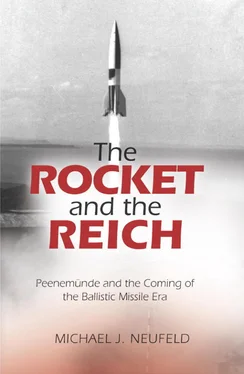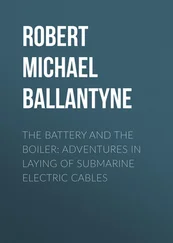Michael Neufeld - The Rocket and the Reich
Здесь есть возможность читать онлайн «Michael Neufeld - The Rocket and the Reich» весь текст электронной книги совершенно бесплатно (целиком полную версию без сокращений). В некоторых случаях можно слушать аудио, скачать через торрент в формате fb2 и присутствует краткое содержание. Город: Washington, Год выпуска: 2013, ISBN: 2013, Издательство: Smithsonian Books, Жанр: История, military_weapon, на английском языке. Описание произведения, (предисловие) а так же отзывы посетителей доступны на портале библиотеки ЛибКат.
- Название:The Rocket and the Reich
- Автор:
- Издательство:Smithsonian Books
- Жанр:
- Год:2013
- Город:Washington
- ISBN:978-1-58834-466-3
- Рейтинг книги:3 / 5. Голосов: 1
-
Избранное:Добавить в избранное
- Отзывы:
-
Ваша оценка:
- 60
- 1
- 2
- 3
- 4
- 5
The Rocket and the Reich: краткое содержание, описание и аннотация
Предлагаем к чтению аннотацию, описание, краткое содержание или предисловие (зависит от того, что написал сам автор книги «The Rocket and the Reich»). Если вы не нашли необходимую информацию о книге — напишите в комментариях, мы постараемся отыскать её.
The Rocket and the Reich — читать онлайн бесплатно полную книгу (весь текст) целиком
Ниже представлен текст книги, разбитый по страницам. Система сохранения места последней прочитанной страницы, позволяет с удобством читать онлайн бесплатно книгу «The Rocket and the Reich», без необходимости каждый раз заново искать на чём Вы остановились. Поставьте закладку, и сможете в любой момент перейти на страницу, на которой закончили чтение.
Интервал:
Закладка:
At the same time Nebel was in further trouble with his own colleagues and with the state. In late September Ley and retired Major Hans-Wolf von Dickhuth-Harrach, the president of the VfR since 1930, denounced Nebel to the state prosecutor for fraud and expelled him from the society. The VfR and the Raketenflugplatz had existed in an uncomfortable symbiosis; even though Nebel had been the VfR’s Secretary, the society had formally kept its distance from some of his dubious projects, such as the Magdeburg rocket. The prosecutor found no legal grounds to charge him, which Ley attributed to Nebel’s Nazi connections, but the report shows that he had stayed just inside the law or that the bookkeeping was too ambiguous to allow any conclusions. It did not hurt that Klaus Riedel continued to defend Nebel’s actions. This nasty conflict basically reflected the collapse of the VfR and the Raketenflugplatz due to monetary problems and Nebel’s personality. 49
As a countermove, Nebel attempted to register the Raketenflugplatz as a society in its own right. But the group had numerous other problems as well. Its three-year lease on the land expired in July 1933, and access to the old ammunition dump became more difficult. Herbert Raabe, a VfR member and occasional visitor to the Raketenflugplatz, remembers being turned away by a soldier guarding the site when he came to visit in the late summer or early fall. After the lease was up, Army administrators also presented Nebel with a water bill for 497 marks that had accumulated, so it was later claimed, because of dripping taps in the buildings. Ordnance refused to take responsibility for the bill and intervened in December to deny Nebel’s petition for the recognition of the Raketenflugplatz as a society. 50
Meanwhile, Rolf Engel had returned to Berlin and had begun an effort to coordinate the remaining amateur rocket societies in the hope of salvaging something. By Engel’s account, Nebel agreed to cooperate with him, even though Engel had quit the Raketenflugplatz two years earlier because he felt that Nebel had embezzeled its funds. They approached Wernher von Braun, then saw Karl Becker, who had been promoted to Brigadier General and appointed chief of the Ordnance Testing Division early in 1933. The meeting turned into a shouting match, Engel recalls, after Becker refused to offer them anything but secret work under Ordnance’s control. Klaus Riedel had already contacted von Braun a number of times to arrange a rapprochement between Ordnance and Nebel. Von Braun told the Gestapo in July 1934, during an interrogation about his contacts with Nebel, that he had refused to talk to Riedel on the phone. Instead he had met his old friend about five times and warned him that “if Nebel continued his campaign against Army Ordnance, serious consequences could follow”—that is, arrest. 51
In early 1934 the VfR folded. Its remaining members were taken into an obscure “Registered Society for Progressive Transportation Technology,” which carried a few spaceflight articles in its journal from 1934 to 1937. Later in the 1930s another spaceflight society was founded, and it too published a journal, but the discussion was sustained only among a small band of enthusiasts. From the standpoint of the public, rocketry disappeared in 1934 because of the imposition of censorship. Even before the formal press controls were in place, the Army had arranged for the suppression of publications about the topic. Schneider stated in a letter drafted at the end of 1933: “Testing Division was recently forced to intervene a number of times against undesirable propaganda and press statements by Nebel.” After a delay that annoyed Ordnance, Josef Goebbels’s Propaganda Ministry finally issued a decree on April 6, 1934, banning all discussions of rocketry that mentioned either military uses or technical details. 52
Rudolf Nebel was a survivor of truly amazing proficiency; all the harassments and problems failed to stop him. He set about working his connections with Labor Minister and Stahlhelm leader Seldte. In mid-1933 the Stahlhelm had been “coordinated” as a Nazi veteran’s organization under the supervision of the SA, or Brownshirts, the Nazi paramilitary wing that had provided the thugs for street battles and the seizure of power. Although there was tension between the leaders of the SA and the Stahlhelm as a result of this enforced amalgamation, Nebel had a chance to use his connections to exploit the growing hostility between the SA and the Army. Under the leadership of Ernst Röhm, the SA was laying claim to being the mass army that would supplant the old military. It also made rumblings about the need for a “second revolution” because Hitler had made too many compromises with the capitalists and was not in favor of the immediate plundering of the Jews.
A full picture of Nebel’s contacts with the SA will never be known; he conveniently omitted them altogether from his memoirs. Seldte may or may not have put him in touch with Röhm, but the Nazi Gauleiter (regional party boss) for Hamburg did arrange a meeting between the Nebel and the SA leadership through the intercession of an admirer who accepted Nebel’s self-description as a poor inventor abused by the Army. Röhm was not present, but Nebel’s cause was taken up by Obergruppenführer (Lieutenant General) von Krausser, who promised to talk to Röhm. According to Rolf Engel, who joined the SA in October 1933 and later became a Nazi student leader and SS officer, he also met von Krausser and, on another occasion, Röhm himself. 53
In the meantime, Nebel had received an innocent inquiry from a scientific institute in Warsaw about the possibility of building a stratospheric rocket. He immediately wrote to Hitler, Goebbels, the Foreign Minister, and other authorities in an attempt to exploit hatred of Poland to gain support for his activities. After a call from the Reich Chancellery on February 23, 1934, Schneider wrote a memo indicating that he had stopped this Nebel initiative. The memo also reveals that the SA leadership had intervened with the Army on behalf of Nebel not long before. 54
On March 10 Schneider drafted a letter to Röhm explaining the Army’s reasons for rejecting Nebel. The document, which was routed through the Army High Command and the Defense Ministry, had a pleading tone that reflected the tension between the Army and the Nazi movement. It noted that on September 21, 1933, Hitler, Göring, and Interior Minister Wilhelm Frick had seen a demonstration of rocketry during their tour of Kummersdorf and that on February 8, 1934, the same tour had been given to Deputy Führer Hess and “a number of higher SA leaders.” The Army wished to overcome the “mistrust that is obviously present” by giving an SA representative full insight into the much more systematic work going on at Kummersdorf under military auspices. Under separate cover an explanation of the Army’s dealings with Nebel was to be sent as well. 55
That expedient seems to have worked temporarily, but Nebel did not give up. In May Seldte wrote to the Reich Post Ministry asking that it support Nebel for the civilian purpose of developing mail rockets. The ballistics and munitions section was able to frustrate that initiative as well. But it had so far been unable to move the Gestapo to arrest Nebel, a matter about which von Horstig—Becker’s successor as section head—had inquired in March. Nebel probably avoided arrest because of his connection with Seldte. 56
At the beginning of June an opportunity finally presented itself. Nebel had arranged for the printing of a booklet entitled “Rocket Torpedo” in which he discussed the possibilities of rocketry for anti-aircraft defense, ballistic missiles, and gas attacks. Schneider and von Horstig immediately requested that Nebel be arrested for violating secrecy. Nothing happened right away. Nebel sent his brochure to the SA leadership, and on June 21 it intervened again on his behalf. Exactly one week later a representative of the Stahlhelm leadership called Ordnance and mysteriously requested an immediate confidential meeting regarding Nebel. Schneider and von Horstig were able to convince him that the Army’s position was justified. 57
Читать дальшеИнтервал:
Закладка:
Похожие книги на «The Rocket and the Reich»
Представляем Вашему вниманию похожие книги на «The Rocket and the Reich» списком для выбора. Мы отобрали схожую по названию и смыслу литературу в надежде предоставить читателям больше вариантов отыскать новые, интересные, ещё непрочитанные произведения.
Обсуждение, отзывы о книге «The Rocket and the Reich» и просто собственные мнения читателей. Оставьте ваши комментарии, напишите, что Вы думаете о произведении, его смысле или главных героях. Укажите что конкретно понравилось, а что нет, и почему Вы так считаете.












